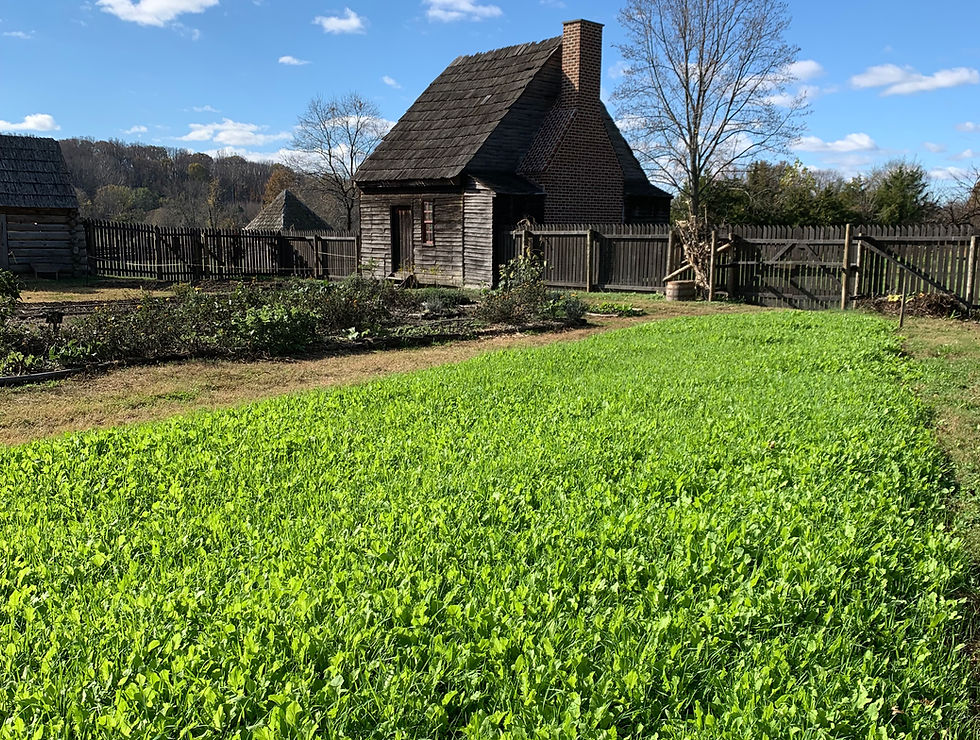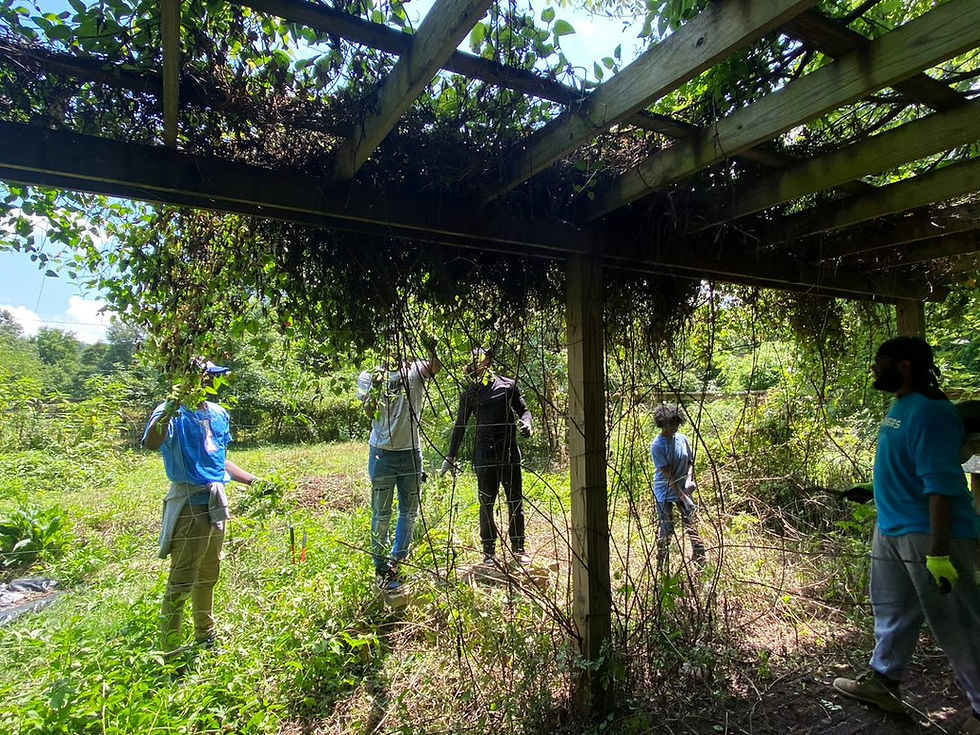Field Notes: Volume 16, Number 25
- Accokeek Foundation

- Nov 4, 2011
- 6 min read

This Week’s Harvest
Fennel
Green Bell Peppers
Garlic
Lemongrass
Cabbage
Leeks
Turnips (Hakurei)
Radishes
Arugula
Mizuna
Lettuce (Red Loose Leaf)
Endive
By Courtney Buchholtz
So we have arrived at the end. There was a time in July when I wasn’t sure I would see the end, and now here we are, staring it straight in the face. As I begin to reflect on the months past, there are so many thoughts that come to mind, but which are most worthy of sharing? First is the gratitude for the land and all that it has provided us this year. I am grateful for the opportunity to experience the Ecosystem Farm, with all of its nuances. The birds, insects, and wildlife have enriched my life in so many ways. Farming can be much like riding a roller coaster at the amusement park—many twists, turns, and unknowns to keep one on the edge of her seat, yet securely fastened and along for the ride. This season has been much like that. Plopped into a longer season, different climate, and so many unknowns I will say unabashedly that the Ecosystem Farm crew did a wonderful job getting the produce we did to your tables. Being a humble Midwesterner, I am not accustomed to making such comments, but feel so much gratitude for all the efforts given by staff and other volunteers who helped make this year a possibility. While there is much that we could lament over, things that we would have changed (in hindsight), and others we would have liked to do, it is what it is, and we are proud of our efforts nonetheless.
So now we will put the field to rest for the winter and put pen to paper and write our reports to better help those who will come after us. Part of farming is the passing on of knowledge and experience so that others may also reap the benefits. We also look forward to attending various conferences that occur during the off-season months to deepen our knowledge of the vast world of farming. There are many options to choose from in the region, and this year I am pleased to be attending one of my favorites: the Acres U.S.A. Conference. It is conveniently being held in Columbus, Ohio, which, by the way, is home to Jeni’s Ice Cream, some of the best and most unique local, grass-fed milk ice cream around. Celery and golden raisins, anyone? They truly have it all, and I look forward to a stop there while in town. Ice cream aside, the Acres Conference focuses on soil, which is where all of our work begins as a farmer, and it’s a place where a bunch of people come together and get excited about a common thread: our love of the land. New ideas, strategies, and methods are exchanged, and new friends are made. This is our time of the year to be social, and we have a lot of making up to do! Colette and Jose are also attending Maryland’s Small Farms Conference this weekend, and will again strengthen the ties within the community by building relationships and sharing information.
With new information in hand, we as farmers continue to push the boundaries, trying to progress to the next level to build resiliency in our systems while at the same time encouraging our local communities to do the same. Resilient communities will withstand the storms to come with much greater ease than those that are not prepared, so it is our hope to continue to be a part of that process. I encourage you all to take part because one person truly can make a difference.
While plans remain uncertain for where we all will be farming next year, the Ecosystem Farm will continue forward with business as usual. There will be a new farmer and crop of apprentices ready to carry on Jean Wallace’s legacy for educating the next generation of farmers. And we need that next generation more than ever. In 2002 the average age of all principal farm operators in the United States was approximately 55. Fast forward to 2011, and that puts them close to pushing 64. In 2002, just over 26 percent of farmers were 65 or older, with a mere 5.8 percent being 35 or younger. I shudder to think of where those numbers are at now. There seems to be great interest in farming amongst young people like myself, and we need to keep encouraging those people to stick with it. There needs to be support from the public and the government if we all want to have a more secure food system in the years to come. The next Farm Bill will go a long way towards shaping our food system here in the United States, and the process is already under way. Please do your part as a citizen of this country and get involved so that all of us can have a more just food system and eat nutritious, healthy food every day. Stand beside us and give voice to this important movement.
The endive gracing your boxes this week is a broad, flat-leaved variety that is slightly less bitter than other endives. High in vitamins A and K, endive is also rich in folate and fiber. You can eat it like many other greens by chopping it into a salad or stew, or sauteeing it with other vegetables for a stir fry.
The long, green, stick-like item is lemongrass. Native to the Philippines, it is commonly used in Asian cooking and has a wonderful citrus flavor. It is often used in teas, curries, and soups, but is suitable for poultry, fish, beef, and seafood. So take a trip across the Pacific this weekend and cook yourself a meal with Asian flair.
We thank you all for hanging with us during this tumultuous ride of a year. As the roller coaster slows to a halt, I hope you have taken away more than just the produce; I know I certainly have. I shall close with some words from a favorite Minnesotan you may all know–Garrison Keilor: “Be well, do good work, and keep in touch.”
—Your Farmers
Below, photos from this week on the Ecosystem Farm. Click images to enlarge, or view them on Flickr.
Recipe: Lemongrass and Citrus Poached Salmon
Ingredients:
2 1/2 pounds salmon fillet
1 quart chicken stock
1 quart orange juice
2 cups white wine
1 small yellow onion, chopped
2 tablespoons minced garlic
2 cups chopped lemongrass
1 teaspoon salt
1 teaspoon white pepper
Directions:
Remove skin from salmon, then cut into desired portions.
In a large pot, combine chicken stock, orange juice, white wine, onion, garlic, and lemongrass. Season with salt and white pepper. Bring to a boil for 5 minutes. Reduce heat to a low boil. Place the salmon in the poaching liquid and cook until flaky and tender, about 5 minutes.
Recipe: White Beans with Bacon and Endive
Ingredients:
8 slices bacon, coarsely chopped
1 medium onion, chopped
1 1/4 to 1 1/2-pound head curly endive, rinsed, leaves coarsely torn
2 large garlic cloves, chopped
2 15-ounce cans cannellini (white kidney beans), drained well
1/3 cup canned beef broth
Directions:
Cook bacon in a large, heavy pot over medium-high heat until brown and crisp. Using a slotted spoon, transfer bacon to paper towel-lined plate and drain; set aside.
Add onion to bacon drippings in pot and saute until just beginning to soften, about 4 minutes. Add half of endive with water still clinging to leaves. Cover pot and cook until endive is wilted, stirring once, about 4 minutes. Add remaining half of endive and chopped garlic. Cover and cook until endive leaves are wilted, but still bright green, stirring once, about 4 minutes. Add cannellini, beef broth, and bacon. Cook bean mixture until heated through, stirring often, about 5 minutes. Season to taste with salt and pepper.
Upcoming Events
Twilight Tales: New Date! Friday, November 4, 2011, 6 to 9 p.m., Accokeek Foundation Visitor Center: When night descends on the Potomac River, this historic site comes alive with spirits from Maryland’s past. From 6 to 7 p.m., visitors can enjoy scary stories and songs performed as the sun sets across the river. From 7 to 9 p.m., brave able-bodied souls may venture out to explore the haunted farm house. Then, follow a mysterious guide by lantern light through the fields to the Tobacco House and meet criminals and other lost souls from Colonial Maryland. This scary journey is appropriate for ages 8 and up.
Monthly Foodways: The Tidewater Gift: Saturday, November 19, 2011, Noon to 1 p.m., National Colonial Farm: Join us for a kitchen table conversation as we introduce you to the epicurean delights of colonial Marylanders. Learn how our tastes and the food itself have changed over 300 years as we explore the “receipts” (recipes) and meal preparation for everything from peas and pottage to food traditions for which Maryland is known. This month’s menu will include collups of oysters, buttered crabs, baked fish, oyster stew and tidewater crabcake.







